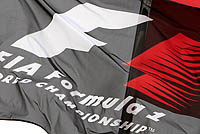 Formula One's commercial rights-holder the F1 Group has implemented new rules and a new committee to prevent bribery and ensure that best business practice is always followed.
Formula One's commercial rights-holder the F1 Group has implemented new rules and a new committee to prevent bribery and ensure that best business practice is always followed.
The F1 Group already had an audit committee and a remuneration committee and an ethics committee has now been added to the list. It comes in the wake of the introduction in the UK this year of the 2010 Bribery Act and it is a particularly sensitive issue in F1 since a great deal of the rights-holder's business is centred on the Paddock Club corporate hospitality area. Access to it and F1's paddock itself may need to be given, on a completely legitimate basis, to relevant businesses to show them the experience which is on offer. The new rules make it very clear what is allowed and what is not. It is an extremely sensible and positive step which further institutionalises F1.
The new rules were issued on 1 July 2011 and were provided to every officer and employee of the F1 Group with additional rules and guidelines applying solely to the company's senior executive team. Pitpass has seen copies of the rules from several high level sources. The 24-page code of ethics and business conduct states that it is also relevant to anyone (regardless of geographic location) who provides services for or on behalf of the F1 Group such as consultants, agents, introducers, contractors, suppliers and freight service providers.
The anti-bribery principles state clearly that the F1 Group "require that all third parties with whom we do business agree to act in accordance with those principles at all times." Crucially, and as would be expected, it states that "appropriate limits are placed on the value of corporate hospitality and gifts that can be given or received." It adds that "particular care should be taken in any dealings with any foreign official who (i) holds a position in any branch of government, (ii) exercises a public function for any public agency or public enterprise, or (iii) is an official or agent of a public international organisation (a Foreign Public Official). All such dealings must be appropriate and legal."
The code of ethics and business conduct quickly gets to the core of the matter as it states that "Formula One is a hospitality and entertainment-centred business. At the very heart of the business is the enjoyment of the millions of fans who watch the Grand Prix events. It is acknowledged that the Formula One Group makes use of Hospitality in its interactions with many of its business partners in order to create sustainable business relationships and successful Grand Prix events. Offering or accepting invitations to lunches, dinners or, say, a sporting event is generally appropriate if the purpose is a bona fide business discussion or interaction or to foster better business relations."
The new rules certainly aren't unreasonable as they also state that "the offering or acceptance of Gifts of nominal value is also usually appropriate. However, the offering or acceptance of any Gift of more than nominal value might be viewed, in certain circumstances, as a bribe. All Gifts offered or accepted must therefore always be reasonable, proportionate and bona fide." They add that "officers, consultants and employees of the Formula One Group (except for members of the Senior Executive Team) may not offer, promise or give Gifts that are of greater than nominal value, without written authorisation of the Legal Department." This all sounds perfectly sensible and it even covers circumstances where it might be more detrimental to decline than accept.
"Occasionally, Gifts may be offered or given to you in circumstances where refusal may cause offence. In such cases, the Gift may be accepted if thought appropriate to do so, but then must be immediately reported to the Legal Department. If it is not appropriate to return the Gift, the Legal Department will determine what action is appropriate (e.g. the Gift being retained by the Formula One Group or donated to charity)."
Interestingly, the code also clearly states that "the provision of any Paddock Passes or complimentary Grand Prix event tickets, by or on behalf of the Formula One Group, always requires the prior, written approval of the Group CEO." It adds that "tickets to Grand Prix events, Paddock Passes and Paddock Club tickets must never be provided to any person in a manner which is intended to, or may appear to, improperly induce others, or be seen as an attempt to improperly influence the outcome of a business decision."
We use the word 'interestingly' because Pitpass knows of many examples where F1 sports reporters, event organisers, and other similar workers in the F1 paddock, have been given passes to hand to their personal friends - and in the case of one particular journalist for commercial purposes… advertising paddock passes as part of a tour package.
The F1 Group code sets a standard and all the teams really should follow suit but if they do so then the days of them handing out guest passes to journalists and the like will have to come to an end. Any team which decides not to implement an equivalent code will be singling itself out for criticism.
The consequences of breaking the F1 Group code are as serious as they come. It bluntly states that any failure to comply (or acquiescence as to a breach, including by failing to report such breach) "may lead to disciplinary action. In appropriate circumstances, this could lead to dismissal."

 Formula One's commercial rights-holder the F1 Group has implemented new rules and a new committee to prevent bribery and ensure that best business practice is always followed.
Formula One's commercial rights-holder the F1 Group has implemented new rules and a new committee to prevent bribery and ensure that best business practice is always followed.



















sign in